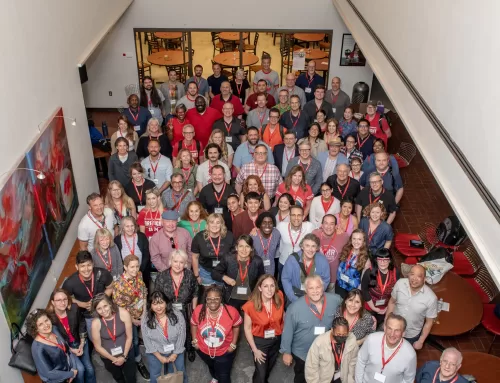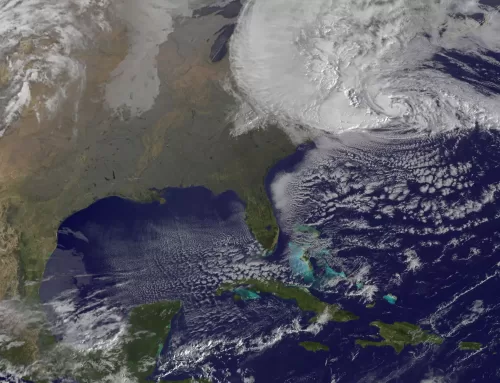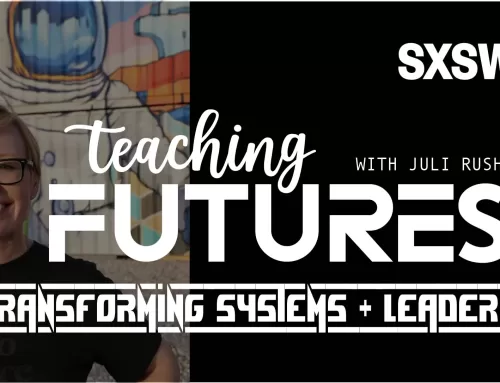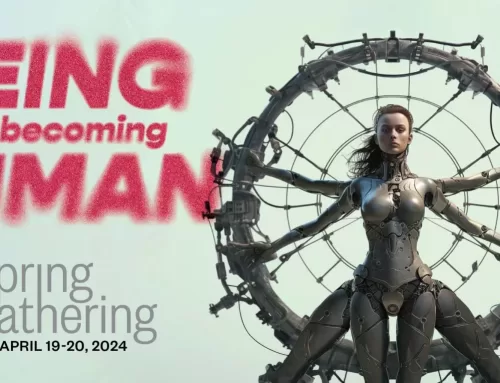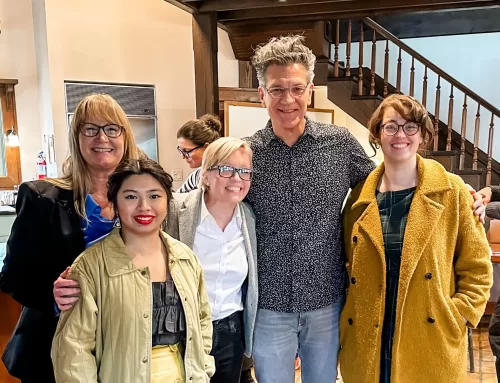“Everyone really had a great time. The energy was super-positive. We got lots of comments about how great it was to be back together in person. I think this will go down as a semi-legendary event 😊” – Words from Dr. Hines as he reflected on the APF Pro Dev and Skeptical Spectacle! Spring Gathering.
This past weekend, around 40 – 50 futurists gathering in Houston for our annual in-person get together (that had been suspended the last few years due to COVID).
On Friday we attended the Association of Professional Futurists (APF) Professional development (Pro Dev) day. We were fed information on (and participated in) the topics:
- Archetypes Across 3 Horizons
- Emerging Practices Methodology, and
- Ethnographic Experiential Futures (EXF)
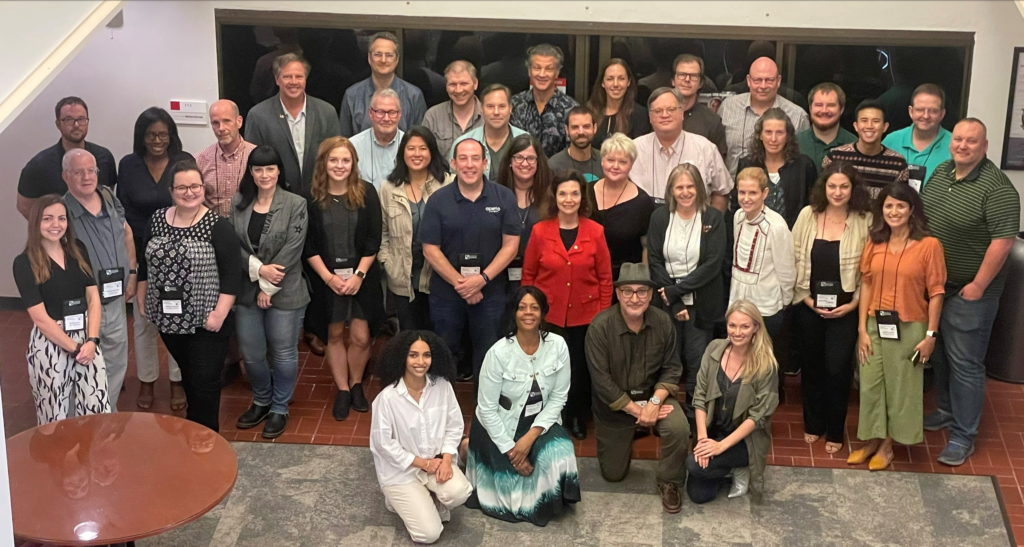
On Saturday we were able to look under the hood and see what our Design Futures students were working on all semester. Professor Adam Cowart kicked us off on an introduction to what happening in the realm of design futures today and why it’s so important to have this skill as futurists. The rest of the day, participants journeyed through immersive displays on:
- Death
Aiming to portray a future where death is de-stigmatized, the team took existing technologies: alkaline hydrolysis, terraburial, and anerobic-bioconversion, and framed them in a future where they were common and preferred. The earth has become the primary stakeholder, and societal priorities were focused on community and re-unification with the earth. Participants went through an experiential, theatrical process of what it would be like to lose their fear of death, elevate their consciousness and, much like a modern funeral home, explore their options to decide how they would most like to re-integrate into the life cycle. The goal was for participants to leave with an interest in continuing this conversation, to further research the technology already available to us and to consider making death related decisions that could move us closer to a preferred Future of Death. - Sex & Intimacy
The future of sex and intimacy explores a world in which shame has been eradicated- specifically shame associated with sex, intimacy, and relationships. This experiential future transports participants to Clear River High School’s Social Emotional Xcellence (S.E.X) curriculum in the year 2052. The team crafted an experiential scenario set at a Parent-Teacher meeting to preview a completely re-designed high school sex education curriculum. It explored a variety of provocative topics including shameless pleasures, sexual identity, human-to-human and human-to-robot relationships, kinks and preferences, and consent. Parents had the opportunity to explore and learn to model behaviors grounded in personal integrity and values as it relates to sex and intimacy in order to extend the classroom into the home, creating a fully integrated learning environment. How would the world be different if we knew we would be accepted – kinks, oddities, and all? - Sports
The future of sports in 2102 was an expo style, fully exploitable display that posed the question, “why are we still using bombs, bullets, and destruction to solve conflicts?” What would society look like if sports became the conflict resolution space? The team explored Zoe Skyes’ desk and asked participants to take a look at a day in the life of a coach and international organization representative in this experiential future - Public Transportation & Safety
In New York City alone, public transportation dropped 90% during the pandemic. These rates have yet to recover, setting off a vicious cycle of decreased income from fares, and increased petty and violent crime. Should this continue to spiral downwards, the future of public transportation as we know it will be jeopardized for urban city dwellers, commuters, tourists, and the like. In this project, we tackle how scenarios of the future might play-out to combat subway crime and violence, focusing on a specific hypothesis: what if sharing our personal data more publicly could create more empathy amongst strangers and thus ultimately reduce subway-based crime? - Cities
By 2070, two significant developments have followed the inundation of major cities along the east coast of the US: numerous floating, collaborative communities have been developed along the coast; and a technology-enabled and sophisticated barter economy has emerged, linking these “Aquacommons” to each other and to the other collaborative communities such as the Geocommons and VR Commons. After viewing a background story narrated by the avatar of one resident of the Provincetown Aquacommons in what is now the Cape Cod Archipelago, participants were invited to project themselves forward to his world in 2070 with the aid of several detailed persona cards. Using the persona cards’ information about their knowledge, skills, and abilities, participants were invited to propose barter arrangements with the avatar, who was available following the background video for live questions and answers. - Government
What is the future of participation in democracy? We explored a lot of angles and options for what that might look like. Ultimately, we settled on an experience for the election of 2065 to allow participants to be introduced and calibrate their own digital twin which was built off their digital footprint, which would participate directly in voting on policy decisions on behalf of the participant. There are many questions that arise here: can we bypass corruption by elevating direct participation? Can we focus on describing people’s values instead of their opinions as a foundation for voting? Does the future require a major restructuring of how we expect government participation to work? - Truth
The team posed an experiential project where participants interacted with a determining jury selection in an intensified complex truth environment, specifically regarding an act of shame possibly covering up an act of violence. Team members utilized multiple technologies and created an understanding of metaphysical and physical differences, our reactions and acceptance of each and how the perceived world may or may not be what we believe—and who controls that as we move deeper into distributed, unmonitored channels and new technologies. - Time Spent
In a future that feels like an extension of the present, how does the average American with access to the latest technologies “choose” to spend their time? This team explored cutting edge medications and ancient physiological rhythms, self-regulation of bodily functions, a microchip that fixes everything and the choice to go outside in nature or bring “nature” into our lives as packaged products. Through film and artifacts, personas were created from the future to bring in a juxtaposition of choices of how time is being spent.
Did the information and experience inspire, motivate and equip us with new tools? YES to all. It was a memorable experience and was wonderful to be in-person amongst our tribe.
Links to the APF Pro Dev presentations are here:
Links to the Spring Gathering presentations are here:
